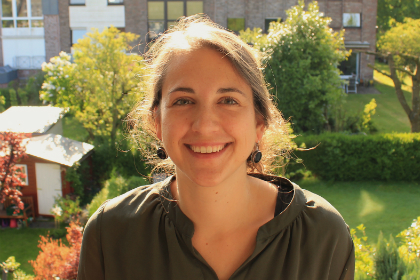 "Travelling has helped me to question what is “normal”, to listen to and appreciate people’s stories, and to be curious."
"Travelling has helped me to question what is “normal”, to listen to and appreciate people’s stories, and to be curious."
Childhood in Aachen
"Both my parents are from Aachen, Germany, or the surrounding area where I was also born and spent the first twenty years of my life. During this period, I travelled quite a bit, with my family, with church and with friends. When I was eight or nine years old, we spent a month in Morocco to visit my stepfather’s family. Being away during the school year was quite a big deal: my mom had to negotiate with the teachers and assure them that I would do some school work while I was absent so that I would not fall behind on the curriculum.
With the church youth group, we went to Denmark and the Netherlands a few times, and helped to build up a church in Bulgaria. I also vividly remember our family’s summer holidays in the south of France. We stayed in a cottage built around an old cave that was previously used to herd goats. To this day, there is no electricity or running water, and I enjoyed how different our holidays in France were from city life.
From New Zealand to Maastricht
After finishing high school, I spent eight months in New Zealand where I bought a minivan with a friend to travel around the country. It was a great experience that significantly shaped me as a person and that I still have fond memories of. Being away from home not only taught me to be self-organized and independent, and to dare to work towards your goals. But it was also great to not have your life planned out for a few months and gave me the freedom to figure out what I wanted to do next. It was here that I made the decision to study Psychology and Neuroscience in Maastricht, the Netherlands.
Teaching in Nepal
After three years at Maastricht University – including one semester abroad in Halifax, Canada – I obtained my bachelor’s degree. Wanting to get more practical experience, I started looking for internships – initially in my hometown but an advert from a school in rural Nepal caught my attention. Without thinking about it too much, I wrote an e-mail to get more information and instantly received a reply from the headmaster: “Let me know when you are in Kathmandu, and I will come pick you up.” I was not sure whether this was a joke but as it turned out it was not, and I found myself teaching children and young people aged 3-16 on a range of subjects shortly thereafter. Since there was a shortage of teachers, I would just check which class was without one, go there, and improvise. My time in Nepal was a lot of fun and showed me a completely different way of life, which made me curious to learn more about other cultures.
Studying Anthropology in Leuven
Initially, I wanted to study Social and Cultural Psychology in London but I did not get a scholarship. Looking for a plan b, I stumbled upon anthropology and decided to give it a try. Everything happens for a reason and I am very happy that I ended up in Leuven, Belgium, for the Master of Social and Cultural Anthropology - after all, anthropology is what I am doing today. I really loved my studies and learned a lot about different frames of reference, and how growing up in different parts of the world shapes your whole perspective. A summer school in China once more confirmed that I should pursue a career in this field. Nevertheless, I was not really planning on doing a PhD - not yet, at least.
PhD in Maastricht
But you reach for those opportunities that life gives you. When I saw an advert on Facebook saying that the MO-TRAYL project was looking for PhDs, I had the feeling that it would fit in very well with what I had learnt so far and the languages that I was able to speak because of my mobility.
When I applied for this PhD position, I was living in Berlin to follow an advanced education in Design Thinking. Becoming a part of the MO-TRAYL team made me move back to my hometown Aachen which had been the place where I kept returning to throughout the years. Reflecting on my travelling experiences, I think that they often gave me the necessary mental freedom to make conscious choices about what to do next. They also helped me to question what is “normal”, to listen to and appreciate people’s stories, and to be curious."